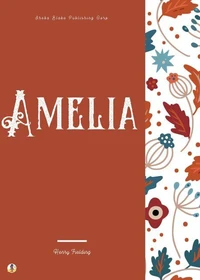An Apology for the Life of Mrs. Shamela Andrews
Par :Formats :
Disponible dans votre compte client Decitre ou Furet du Nord dès validation de votre commande. Le format ePub est :
- Compatible avec une lecture sur My Vivlio (smartphone, tablette, ordinateur)
- Compatible avec une lecture sur liseuses Vivlio
- Pour les liseuses autres que Vivlio, vous devez utiliser le logiciel Adobe Digital Edition. Non compatible avec la lecture sur les liseuses Kindle, Remarkable et Sony
 , qui est-ce ?
, qui est-ce ?Notre partenaire de plateforme de lecture numérique où vous retrouverez l'ensemble de vos ebooks gratuitement
Pour en savoir plus sur nos ebooks, consultez notre aide en ligne ici
- Nombre de pages39
- FormatePub
- ISBN859-65--4717060-0
- EAN8596547170600
- Date de parution15/08/2022
- Protection num.Digital Watermarking
- Taille433 Ko
- Infos supplémentairesepub
- ÉditeurDIGICAT
Résumé
In "An Apology for the Life of Mrs. Shamela Andrews, " Henry Fielding delivers a sharp and satirical response to Samuel Richardson's "Pamela, " reframing the narrative through the lens of Shamela, a clever and manipulative heroine. Fielding's literary style combines wit, irony, and humor as he critiques societal norms and the conventions of the sentimental novel. The text extends beyond mere parody; it serves as a commentary on class, gender, and the complexities of virtue in an increasingly commercialized society.
By employing the epistolary format, Fielding adeptly contrasts Shamela's self-serving motivations with the perceived virtues of Pamela, challenging the reader to reconsider conventional morality and the nature of authentic virtue. Henry Fielding, a formidable figure in the 18th-century English literary scene, was not only a novelist but also a playwright and a social critic. His experiences in addressing the complexities of human nature and societal hypocrisy in his works reflect his own turbulent life, marked by financial struggles and an acute awareness of morality.
This rich background equipped Fielding with a critical lens through which to view Richardson's romantic ideals, elevating his narrative to a position of both entertainment and introspection. This book is highly recommended for readers interested in the evolution of the novel genre, satire, and the interplay between societal expectations and individual agency. Fielding's incisive wit and shrewd observations make this work an essential read for anyone looking to delve into the complexities of early 18th-century literature and its lasting impact on contemporary narratives.
By employing the epistolary format, Fielding adeptly contrasts Shamela's self-serving motivations with the perceived virtues of Pamela, challenging the reader to reconsider conventional morality and the nature of authentic virtue. Henry Fielding, a formidable figure in the 18th-century English literary scene, was not only a novelist but also a playwright and a social critic. His experiences in addressing the complexities of human nature and societal hypocrisy in his works reflect his own turbulent life, marked by financial struggles and an acute awareness of morality.
This rich background equipped Fielding with a critical lens through which to view Richardson's romantic ideals, elevating his narrative to a position of both entertainment and introspection. This book is highly recommended for readers interested in the evolution of the novel genre, satire, and the interplay between societal expectations and individual agency. Fielding's incisive wit and shrewd observations make this work an essential read for anyone looking to delve into the complexities of early 18th-century literature and its lasting impact on contemporary narratives.
In "An Apology for the Life of Mrs. Shamela Andrews, " Henry Fielding delivers a sharp and satirical response to Samuel Richardson's "Pamela, " reframing the narrative through the lens of Shamela, a clever and manipulative heroine. Fielding's literary style combines wit, irony, and humor as he critiques societal norms and the conventions of the sentimental novel. The text extends beyond mere parody; it serves as a commentary on class, gender, and the complexities of virtue in an increasingly commercialized society.
By employing the epistolary format, Fielding adeptly contrasts Shamela's self-serving motivations with the perceived virtues of Pamela, challenging the reader to reconsider conventional morality and the nature of authentic virtue. Henry Fielding, a formidable figure in the 18th-century English literary scene, was not only a novelist but also a playwright and a social critic. His experiences in addressing the complexities of human nature and societal hypocrisy in his works reflect his own turbulent life, marked by financial struggles and an acute awareness of morality.
This rich background equipped Fielding with a critical lens through which to view Richardson's romantic ideals, elevating his narrative to a position of both entertainment and introspection. This book is highly recommended for readers interested in the evolution of the novel genre, satire, and the interplay between societal expectations and individual agency. Fielding's incisive wit and shrewd observations make this work an essential read for anyone looking to delve into the complexities of early 18th-century literature and its lasting impact on contemporary narratives.
By employing the epistolary format, Fielding adeptly contrasts Shamela's self-serving motivations with the perceived virtues of Pamela, challenging the reader to reconsider conventional morality and the nature of authentic virtue. Henry Fielding, a formidable figure in the 18th-century English literary scene, was not only a novelist but also a playwright and a social critic. His experiences in addressing the complexities of human nature and societal hypocrisy in his works reflect his own turbulent life, marked by financial struggles and an acute awareness of morality.
This rich background equipped Fielding with a critical lens through which to view Richardson's romantic ideals, elevating his narrative to a position of both entertainment and introspection. This book is highly recommended for readers interested in the evolution of the novel genre, satire, and the interplay between societal expectations and individual agency. Fielding's incisive wit and shrewd observations make this work an essential read for anyone looking to delve into the complexities of early 18th-century literature and its lasting impact on contemporary narratives.












